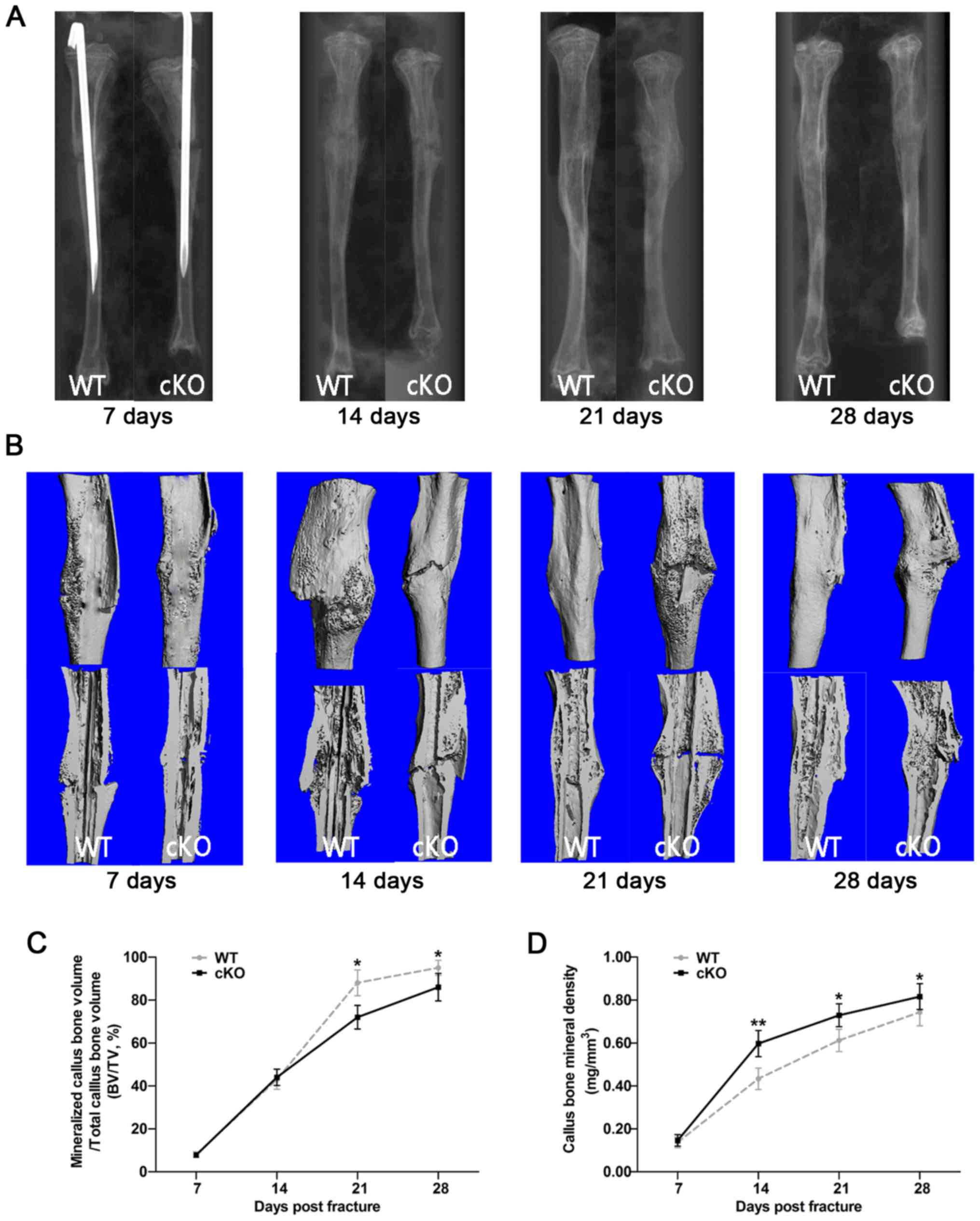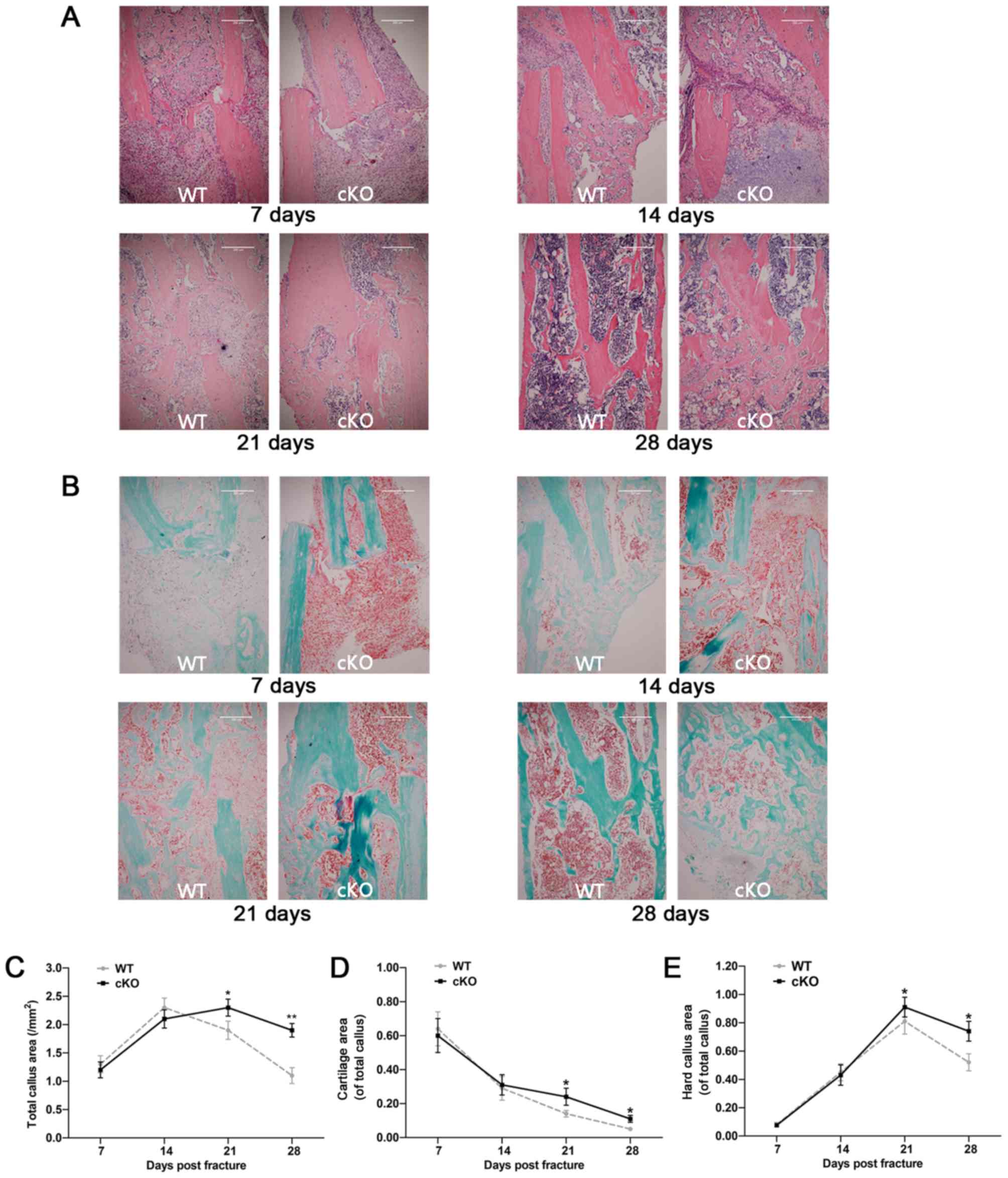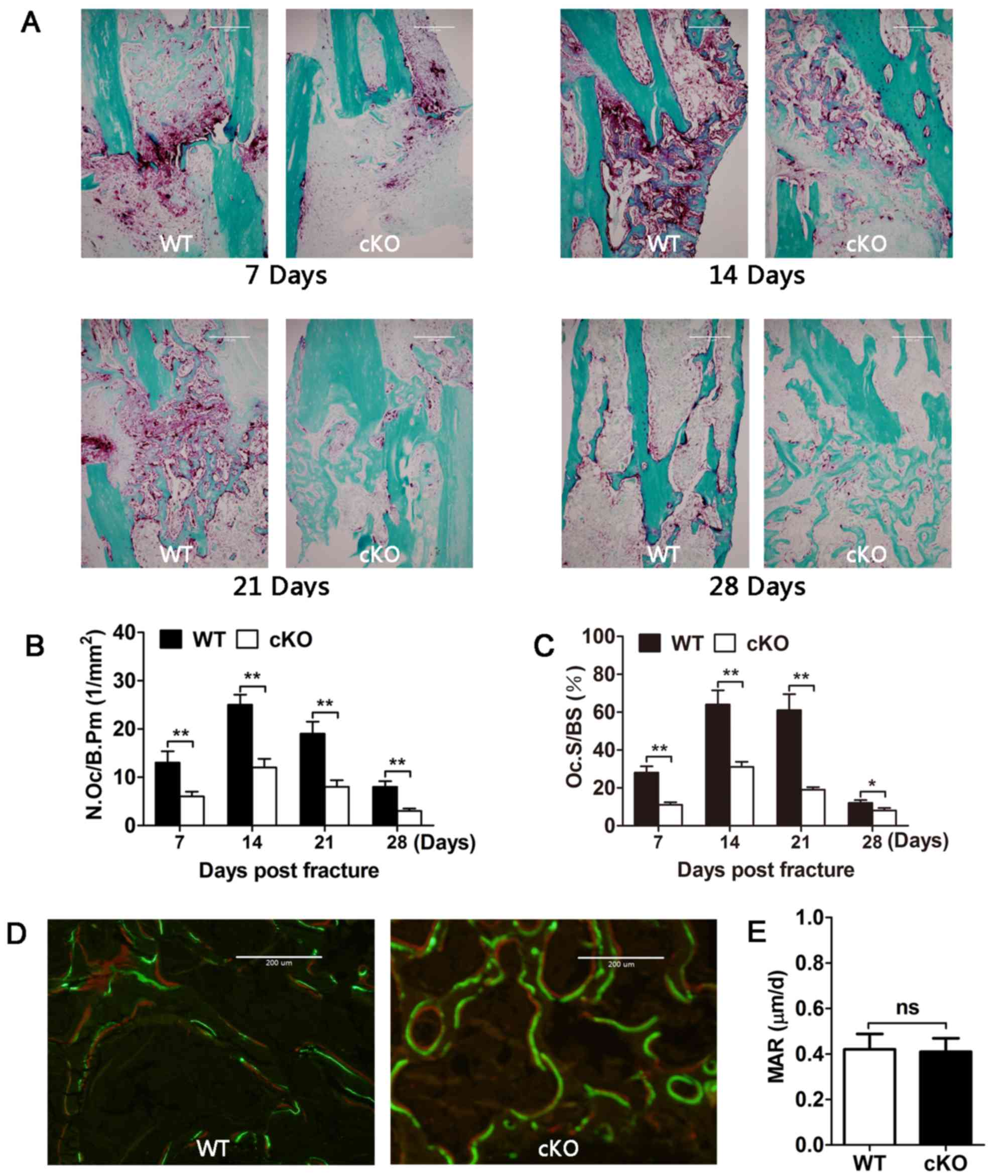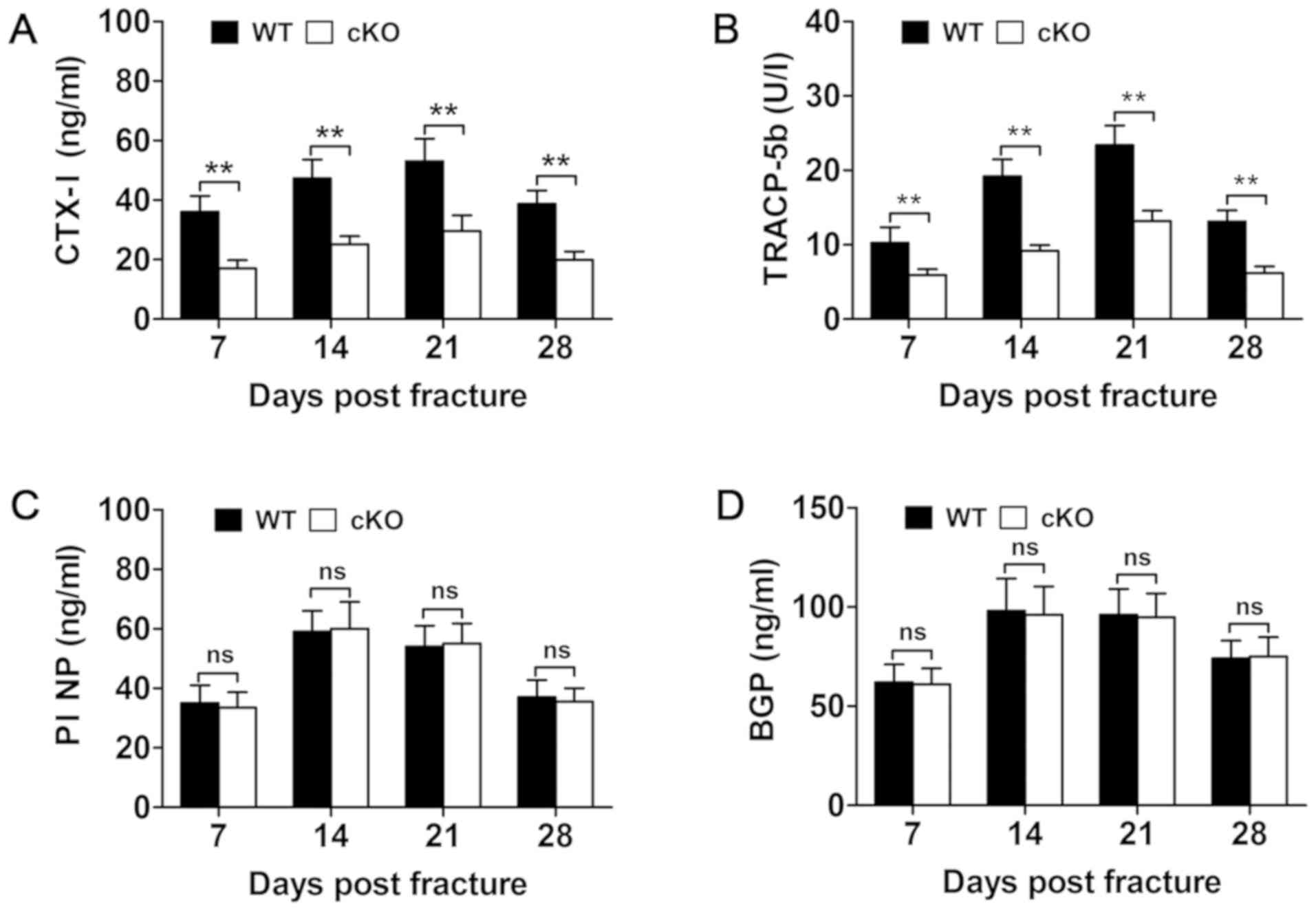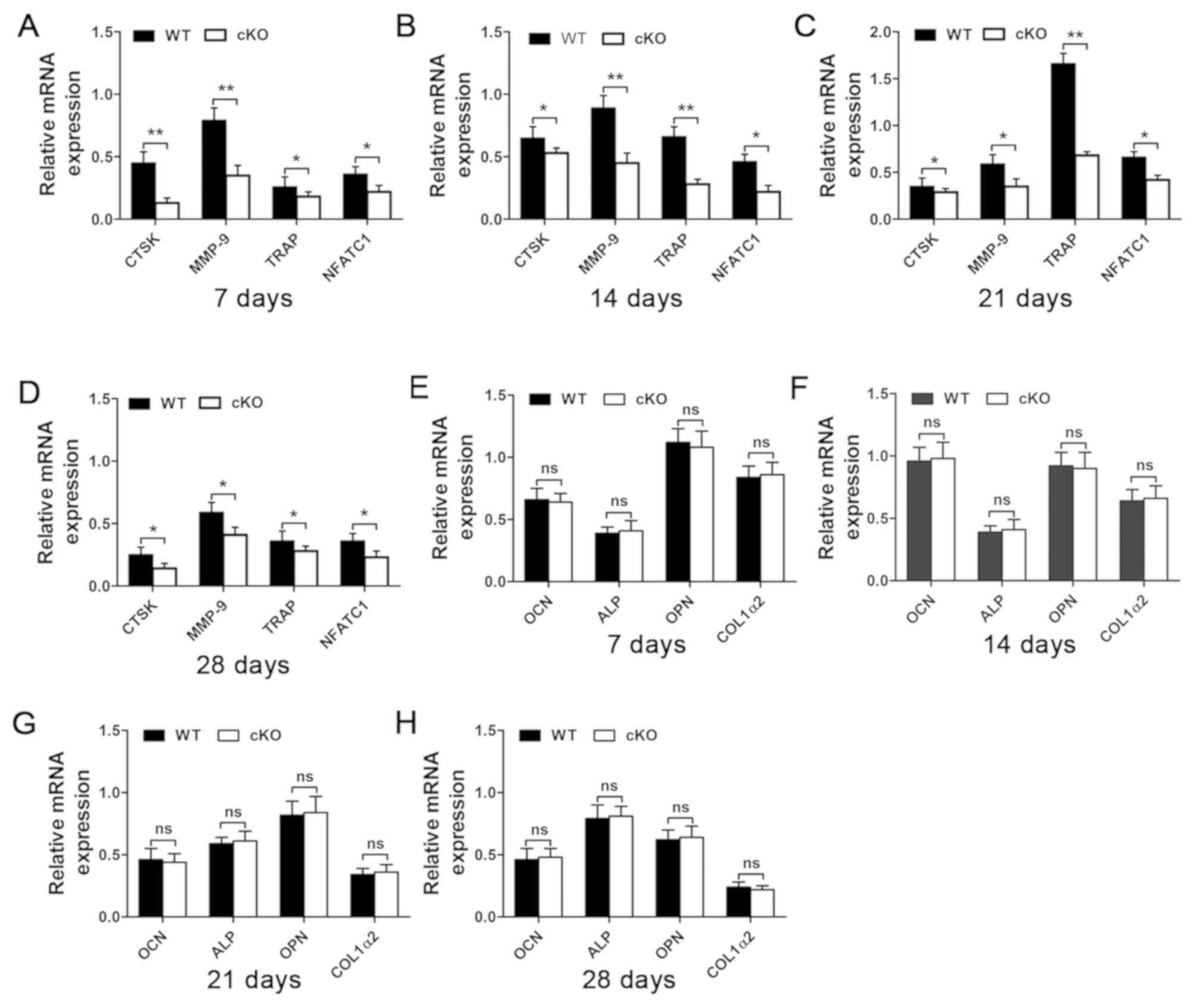|
1
|
Kanis JA, Odén A, McCloskey EV, Johansson
H, Wahl DA and Cooper C; IOF Working Group on Epidemiology and
Quality of Life, : A systematic review of hip fracture incidence
and probability of fracture worldwide. Osteoporos Int.
23:2239–2256. 2012. View Article : Google Scholar : PubMed/NCBI
|
|
2
|
Tzioupis C and Giannoudis PV: Prevalence
of long-bone non-unions. Injury. 38 (Suppl 2):S3–S9. 2007.
View Article : Google Scholar : PubMed/NCBI
|
|
3
|
Hak DJ, Fitzpatrick D, Bishop JA, Marsh
JL, Tilp S, Schnettler R, Simpson H and Alt V: Delayed union and
nonunions: Epidemiology, clinical issues, and financial aspects.
Injury. 45 (Suppl 2):S3–S7. 2014. View Article : Google Scholar : PubMed/NCBI
|
|
4
|
Einhorn TA: The cell and molecular biology
of fracture healing. Clin Orthop Relat Res. 355S (Suppl):S7–S21.
1998. View Article : Google Scholar
|
|
5
|
Claes L, Recknagel S and Ignatius A:
Fracture healing under healthy and inflammatory conditions. Nat Rev
Rheumatol. 8:133–143. 2012. View Article : Google Scholar : PubMed/NCBI
|
|
6
|
Schindeler A, McDonald MM, Bokko P and
Little DG: Bone remodeling during fracture repair: The cellular
picture. Semin Cell Dev Biol. 19:459–466. 2008. View Article : Google Scholar : PubMed/NCBI
|
|
7
|
Hadjiargyrou M, Lombardo F, Zhao S, Ahrens
W, Joo J, Ahn H, Jurman M, White DW and Rubin CT: Transcriptional
profiling of bone regeneration. Insight into the molecular
complexity of wound repair. J Biol Chem. 277:30177–30182. 2002.
View Article : Google Scholar : PubMed/NCBI
|
|
8
|
Gerstenfeld LC, Cullinane DM, Barnes GL,
Graves DT and Einhorn TA: Fracture healing as a post-natal
developmental process: Molecular, spatial, and temporal aspects of
its regulation. J Cell Biochem. 88:873–884. 2003. View Article : Google Scholar : PubMed/NCBI
|
|
9
|
Marsell R and Einhorn TA: The biology of
fracture healing. Injury. 42:551–555. 2011. View Article : Google Scholar : PubMed/NCBI
|
|
10
|
Einhorn TA and Gerstenfeld LC: Fracture
healing: Mechanisms and interventions. Nat Rev Rheumatol. 11:45–54.
2015. View Article : Google Scholar : PubMed/NCBI
|
|
11
|
Ferguson C, Alpern E, Miclau T and Helms
JA: Does adult fracture repair recapitulate embryonic skeletal
formation? Mech Dev. 87:57–66. 1999. View Article : Google Scholar : PubMed/NCBI
|
|
12
|
Xin C, Zhi-Ming H, Yasuaki S, Tomoo T and
Akira Y: Quantitative study of osteoclastic related factors in the
process of bone reconstruction. Hua Xi Kou Qiang Yi Xue Za Zhi.
24:164–165. 2006.(In Chinese). PubMed/NCBI
|
|
13
|
Lin HN and OConnor JP: Osteoclast
depletion with clodronate liposomes delays fracture healing in
mice. J Orthop Res. 35:1699–1706. 2017. View Article : Google Scholar : PubMed/NCBI
|
|
14
|
Cao Y, Mori S, Mashiba T, Westmore MS, Ma
L, Sato M, Akiyama T, Shi L, Komatsubara S, Miyamoto K, et al:
Raloxifene, estrogen, and alendronate affect the processes of
fracture repair differently in ovariectomized rats. J Bone Miner
Res. 17:2237–2246. 2002. View Article : Google Scholar : PubMed/NCBI
|
|
15
|
Flick LM, Weaver JM, Ulrich-Vinther M,
Abuzzahab F, Zhang X, Dougall WC, Anderson D, OKeefe RJ and Schwarz
EM: Effects of receptor activator of NFkappaB (RANK) signaling
blockade on fracture healing. J Orthop Res. 21:676–684. 2003.
View Article : Google Scholar : PubMed/NCBI
|
|
16
|
Gerstenfeld LC, Sacks DJ, Pelis M, Mason
ZD, Graves DT, Barrero M, Ominsky MS, Kostenuik PJ, Morgan EF and
Einhorn TA: Comparison of effects of the bisphosphonate alendronate
versus the RANKL inhibitor denosumab on murine fracture healing. J
Bone Miner Res. 24:196–208. 2009. View Article : Google Scholar : PubMed/NCBI
|
|
17
|
Xiao D, Zhou Q, Gao Y, Cao B, Zhang Q,
Zeng G and Zong S: PDK1 is important lipid kinase for RANKL-induced
osteoclast formation and function via the regulation of the
Akt-GSK3β-NFATc1 signaling cascade. J Cell Biochem. Feb
12–2020.(Epub ahead of print). View Article : Google Scholar
|
|
18
|
Morshed S: Current options for determining
fracture union. Adv Med. 2014.doi:10.1155/2014/708574. View Article : Google Scholar : PubMed/NCBI
|
|
19
|
Mi M, Jin H, Wang B, Yukata K, Sheu TJ, Ke
QH, Tong P, Im HJ, Xiao G and Chen D: Chondrocyte BMP2 signaling
plays an essential role in bone fracture healing. Gene.
512:211–218. 2013. View Article : Google Scholar : PubMed/NCBI
|
|
20
|
van t Hof RJ, Rose L, Bassonga E and
Daroszewska A: Open source software for semi-automated
histomorphometry of bone resorption and formation parameters. Bone.
99:69–79. 2017. View Article : Google Scholar : PubMed/NCBI
|
|
21
|
Abstracts of the Academy of Pediatric
Physical Therapy Poster Presentations at the Combined Sections
Meeting. Pediatr Phys Ther. 31:e31–e69. 2019. View Article : Google Scholar
|
|
22
|
Livak KJ and Schmittgen TD: Analysis of
relative gene expression data using real-time quantitative PCR and
the 2(-Delta Delta C(T)) method. Methods. 25:402–408. 2001.
View Article : Google Scholar : PubMed/NCBI
|
|
23
|
Inada M, Matsumoto C and Miyaura C: Animal
models for bone and joint disease. Ovariectomized and
orchidectomized animals. Clin Calcium. 21:164–170. 2011.(In
Japanese). PubMed/NCBI
|
|
24
|
Frost HM and Jee WS: On the rat model of
human osteopenias and osteoporoses. Bone Miner. 18:227–236. 1992.
View Article : Google Scholar : PubMed/NCBI
|
|
25
|
Ghiasi MS, Chen J, Vaziri A, Rodriguez EK
and Nazarian A: Bone fracture healing in mechanobiological
modeling: A review of principles and methods. Bone Rep. 6:87–100.
2017. View Article : Google Scholar : PubMed/NCBI
|
|
26
|
Loi F, Córdova LA, Pajarinen J, Lin TH,
Yao Z and Goodman SB: Inflammation, fracture and bone repair. Bone.
86:119–130. 2016. View Article : Google Scholar : PubMed/NCBI
|
|
27
|
Kamimura M, Mori Y, Sugahara-Tobinai A,
Takai T and Itoi E: Impaired fracture healing caused by deficiency
of the immunoreceptor adaptor protein DAP12. PLoS One.
10:e01282102015. View Article : Google Scholar : PubMed/NCBI
|
|
28
|
Shefelbine SJ, Augat P, Claes L and Beck
A: Intact fibula improves fracture healing in a rat tibia osteotomy
model. J Orthop Res. 23:489–493. 2005. View Article : Google Scholar : PubMed/NCBI
|
|
29
|
He LH, Liu M, He Y, Xiao E, Zhao L, Zhang
T, Yang HQ and Zhang Y: TRPV1 deletion impaired fracture healing
and inhibited osteoclast and osteoblast differentiation. Sci Rep.
7:423852017. View Article : Google Scholar : PubMed/NCBI
|
|
30
|
McDonald MM, Dulai S, Godfrey C, Amanat N,
Sztynda T and Little DG: Bolus or weekly zoledronic acid
administration does not delay endochondral fracture repair but
weekly dosing enhances delays in hard callus remodeling. Bone.
43:653–662. 2008. View Article : Google Scholar : PubMed/NCBI
|
|
31
|
Ota N, Takaishi H, Kosaki N, Takito J,
Yoda M, Tohmonda T, Kimura T, Okada Y, Yasuda H, Kawaguchi H, et
al: Accelerated cartilage resorption by chondroclasts during bone
fracture healing in osteoprotegerin-deficient mice. Endocrinology.
150:4823–4834. 2009. View Article : Google Scholar : PubMed/NCBI
|
|
32
|
Takahara M, Naruse T, Takagi M, Orui H and
Ogino T: Matrix metalloproteinase-9 expression, tartrate-resistant
acid phosphatase activity, and DNA fragmentation in vascular and
cellular invasion into cartilage preceding primary endochondral
ossification in long bones. J Orthop Res. 22:1050–1057. 2004.
View Article : Google Scholar : PubMed/NCBI
|
|
33
|
Colnot C, Thompson Z, Miclau T, Werb Z and
Helms JA: Altered fracture repair in the absence of MMP9.
Development. 130:4123–4133. 2003. View Article : Google Scholar : PubMed/NCBI
|
|
34
|
Li J, Mori S, Kaji Y, Kawanishi J, Akiyama
T and Norimatsu H: Concentration of bisphosphonate (incadronate) in
callus area and its effects on fracture healing in rats. J Bone
Miner Res. 15:2042–2051. 2000. View Article : Google Scholar : PubMed/NCBI
|















